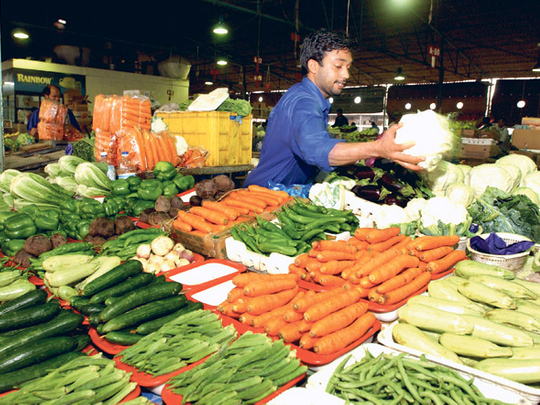
Dubai: More than 90 per cent of the Gulf region's food is imported, according to officials. This has left the region's 36 million people at the mercy of global price shocks.
According to the World Trade Organisation, the GCC is the biggest importer of food in the world with more than 90 per cent brought into the region.
"Growing concerns over food security have pushed countries in the Arabian Gulf to seek solutions to arid land problems," Goutam Malhotra, exhibition manager for AGRA Middle East, said.
Recent estimates by Business Monitor International show that food expenditure in the UAE reached $6.7 billion (Dh24.6 billion) in 2009.
This market is forecast to grow by 2.67 per cent in 2010, making it worth $6.96 billion.
"The region ranks as one of the world's biggest food importers and Dubai is the dominant commercial centre and trading house of the Middle East food sector and an important driver for exporter business growth," Hilal Saeed Al Merri, chief executive officer of the Dubai World Trade Centre, said at a press conference yesterday.
"Dubai is also increasingly re-exporting food products around the world.
"Approximately $1.2 billion worth of food-related commodities were traded in 2008."
According to Standard Chartered's latest food report, the Mena region's growing dependence on food imports is due to water shortages and increasing demand for food from a growing population.
"Growing [food] locally is not a viable option for the UAE as it costs three or four times more to grow local crops than it does to import," Harish Rupani, managing director of Equinox Trading, a food products trading company, told Gulf News.
Inflation
With such a heavy reliance on food imports, the UAE remains increasingly vulnerable to global price fluctuations and changes in trade policies in exporting countries.
Food prices remain at historically high levels — 80 per cent higher than the low mid-2002 levels. They are continuing to rise, according to Standard Chartered's most recent food report.
"The prices of food and commodities have gone into the hands of speculators, which caused a lot of damage in terms of price inflation.
"Over the past five years, rice and sugar have tripled in price," Rupani said.
The changing global climate has also been another factor.
Research by Business Monitor International shows that the UAE government is also making a big effort to increase the number of food processing plants in the country.
The government has ploughed investment worth $1.4 billion into the food sector since 1994.
There are now 150 food processing plants operational in the UAE.
What could the UAE do to decrease its dependence on imported food? Do you choose local brands over international ones when shopping?












